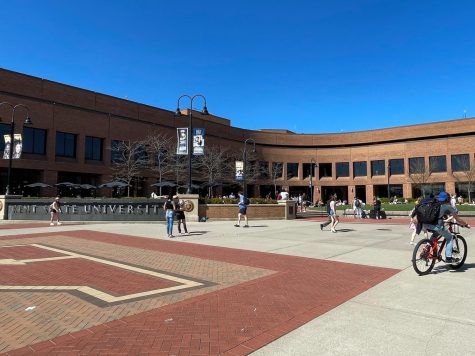The best and only defense
September 19, 2006
When it comes to a helping hand, a community member with food and a smile wins over a desk clerk with paperwork and red tape.
Faith-based charitable organizations, which are required by law to keep religious services separate from aid distribution, form the backbone of a human network of compassion.
Organizations such as Haven of Rest Ministries, which serves the homeless in nearby Akron, provide food for the hungry, shelter for the homeless, and clothing for the needy. Haven of Rest distributes thousands of “Hope Tote bags” filled with personal care items to the needy every year.
In Columbus, Rachel’s House works “to prevent adult women from re-entering prison following their incarceration through education, character and life skill development, and mentoring,” according to their Web site. In helping women turn their lives around, Rachel’s House is forming a strong base, essential for a healthy community.
Such faith-based organizations receive grants from the Federal government and are an important aspect of how the government can provide for the welfare of its citizens. FBOs exist within communities – rather than outside of them like Washington or Columbus bureaucracies – and are able to develop a relationship with the individuals they help. Because of this relationship, FBOs are able to establish a level of trust with aid recipients that a government agency never could.
This is the advantage of a personal relationship; a faith-based organization that provides one-on-one contact can discuss an individual’s needs, and get to the root of the things holding him or her back from employment or housing. Faith-based charitable organizations are made up of community members who are uniquely equipped to understand the needs of their neighbors and are positioned to aid in fulfilling those needs.
Such personal contact will always be superior to a large government program that deals with thousands or millions of people at once, forcing them into pre-sorted categories for paperwork purposes.
A further advantage of faith-based organizations is that they offer aid recipients a hand up rather than a hand out; faith-based organizations offer people opportunities to improve their circumstances, rather than providing a glass ceiling of government subsidized poverty.
For instance, a neighbor who can recommend an unemployed person for a job is worth more than a government program that simply provides a monthly stipend. Or, in another example, a community member’s encouragement to complete a GED will add greater self-worth (and greater earning power), than a program that assigns a number and categorizes an aid recipient into a food-stamp program.
Clearly, faith-based charitable organizations are a form of altruism. FBOs stand up and help out when the government can only kneel down and clasp its hands. It’s important that we, as caring individuals, keep the focus on delivering aid to those who need it the most.
But, for those concerned, the Single Audit Act, a Federal law, requires that all organizations, faith-based and non-faith-based, who receive federal grants conduct extensive reporting about how their grants were used.
Matthew White is a senior magazine journalism major and a point/counterpoint columnist for the Daily Kent Stater. Contact him at [email protected].























